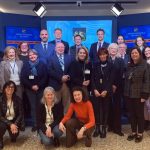Speech by Ignacio Socias during the European Local Inclusion & Social Action Network (ELISAN) General Assembly on “The Inclusive Cities for Sustainable Families project (Venice Declaration) and collaboration opportunities” (14 March 2024) at the Veneto Regional Council, Palazzo Ferro Fini.
As we commemorate the thirtieth anniversary of the International Year of the Family, the United Nations has been analyzing megatrends, including technological advancements, migration, urbanization, demographic shifts, and climate change, to understand their impacts on families and propose responsive, family-centered policies. Sustainable urbanization with affordable housing, a focal point of Sustainable Development Goal 11, is essential for family formation and well-being, influencing the health and welfare of family members. This underscores the importance of creating inclusive, safe, resilient, and sustainable cities for families, an emphasis we’ve been promoting at IFFD.
This urges us to come together and concentrate on sustainable urbanization to ensure that families can access decent housing and enjoy public spaces conducive to intergenerational interactions. Adopting a family perspective could assist in designing cities that cater to residents of all ages and address their needs. Families need access to adequate housing, pollution-free environments, public transport, healthcare, education, culture, safety, green public spaces, and more.
The United Nations system advocates for sustainable urban development worldwide. The UN Human Settlements Programme (UN-Habitat) aims for a better urban future by promoting socially and environmentally sustainable human settlements development and ensuring adequate shelter for all. The United Nations System-Wide Strategy on Sustainable Urban Development supports Member States in investing in sustainable urban development to achieve the 2030 Agenda through collaborative implementation of the New Urban Agenda. This action-oriented document mobilizes Member States and stakeholders to drive sustainable urban development at the local level, envisioning participatory cities and settlements that promote civic engagement and prioritize green public spaces conducive to family well-being.
Also inside the UN, the Division for Social Inclusive Development inside the Department of Economic and Social Affairs, where the Focal Point of the Family is found, supports civil society initiatives, such as the Venice Declaration on Inclusive Cities for Sustainable Families promoted by IFFD, mobilizing local projects and advocating for intergenerational living arrangements with shared services, addressing the needs of vulnerable groups like single-parent, large, and migrant families. This project targets cities and territories aiming to actively contribute to SDG11 by being inclusive of sustainable families and responsive to their needs. Signatories commit to follow up and track progress on the 10 points contained in the Venice Declaration by contributing to the Good Practices Platform.
Currently, 237 territories, including cities and regions, have joined the Inclusive Cities and Sustainable Families Project by signing the Venice Declaration. Signatories pledge to monitor progress on the 10 points of the Declaration according to urban area competencies by contributing to the Good Practices Platform.
I take this opportunity to encourage those already involved in this project to utilize its resources and engage in the exchange of good practices with other signatories. To those who haven’t yet signed the Venice Declaration, I invite you to consider participating in this initiative. I am available to provide further information if needed. Let me add that to the addition of the last two signatories so far, the city of Rio Grande do Sul and the city of Barueri in Brazil, will be further increased here tomorrow by the accession of the Generalitat Valenciana, to which I take this opportunity to publicly congratulate from here.
We support the New Urban Agenda and advocate for integrating an intergenerational perspective in designing family-friendly cities. Secure urban environments are crucial for children and youth to attend school safely and access recreational opportunities, including sports facilities. Accessible transportation and mobility are essential for all generations, including older persons, young people, persons with disabilities, and families with children.
We also emphasize the importance of grassroots efforts, particularly locally sustainable initiatives. Participatory budgeting, allowing city residents to vote for projects enhancing urban living, such as playground construction and public utility infrastructure, is vital. Encouragingly, members of our project have implemented participatory planning methodologies, collecting spatial data to enhance social cohesion among migrant, displaced, and host communities.
And I want to take this opportunity to announce my firm commitment, as some of you already know, to dedicate myself from now on in a more prioritized manner to the training of young people in advocacy, through courses and other academic activities, for which I offer myself in your respective regions. We already have a good number of universities with which we are going to collaborate, and our aim is to ensure a more scientific and professional future to address the many challenges that the future poses for European and global families.
Let’s work together to create more livable, green, and sustainable cities for all generations, advocating for long-term public-private partnerships to invest in affordable housing, infrastructure, and public green spaces for urban families worldwide.
We have just presented our annual IFFD Award to a Korean civil society institution, the Blue Tree Foundation, and I would like to conclude with a definition of sustainability that their president gave us in their acceptance speech: “we will work for a sustainable future if we preserve the vivid memory of the past, the critical vision of the present, and the unyielding hope of the future.” Only this combination of the three elements will allow us to continue advancing without nostalgia, without routine, and without fear.






